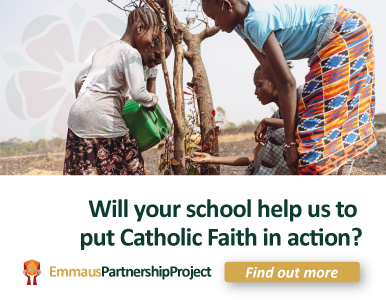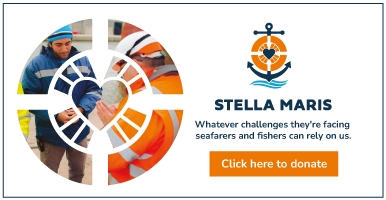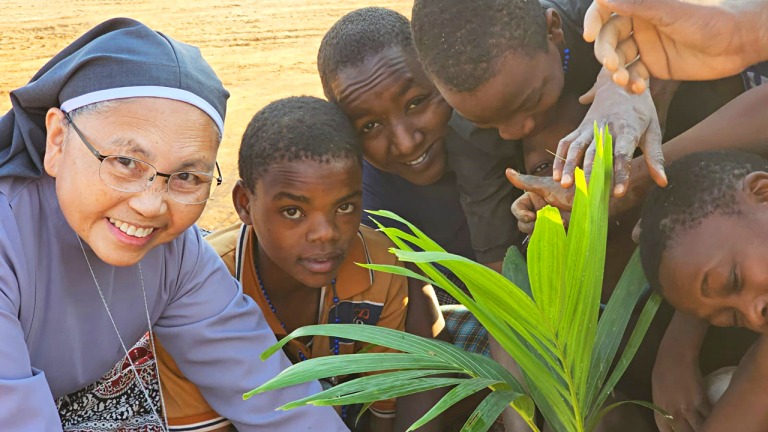Sorry, no records were found. Please adjust your search criteria and try again.
Sorry, unable to load the Maps API.
In the first of our In Conversation with series, JOSEPH KELLY of The Catholic Network talks to Sister Elena Belarmino of the Sisters of Mary, who work with a family of independent, affiliated charities in the US, EU and UK to develop and run humanitarian educational programmes around the world.
Everyone knows that in the parts of the world where poverty is a major issue, education is the key to sustainable, positive change. In particular children can only learn effectively in a safe, secure and loving environment. That is why World Villages for Children supports the education programmes of the Sisters of Mary to run live-in schools for the most deprived boys and girls across the world.
In the Philippines, Mexico, Guatemala, Brazil, Honduras and Tanzania World Villages provide equitable access to education for boys and girls and fund school places and all the daily care needed for nearly 20,000 of the world’s most deprived children. Last year alone they gave 5,253 new children a life-saving place at school.
On 21st September World Villages celebrated the inauguration of a new purpose-built secondary school for boys in Dodoma, Tanzania. It is the 13th school for the Sisters of Mary and their second school in East Africa following their successful establishment of Kisarawe Girls’ School near Dar es Salaam in 2018.
The Sisters of Mary are led by their Superior General, Sr. Elena Belarmino, who was in Dodoma for the inauguration of the school for boys. The Catholic Network’s Joseph Kelly caught up with her to chat about the work of World Villages and the Sisters of Mary …
JK: Good morning, Sr Elena. Firstly, many congratulations on the inauguration of the Dodoma school. We’ve been following and supporting the project very closely here at the Catholic Network and it was a great joy to see it finally open its doors. It must have been really challenging to get the school built?
Sr B: Oh, yes, it was. When we first came to Tanzania in 2018 we started the girls school in the February and accepted our first 100 girls in May. This was a small, one storey building and it was fast to build, but Dodoma is a much bigger project. And we had to become friends with the government to obtain permissions and other documentation, but the government has been very happy to support us. Things do work slowly here and sometimes we do have to push a little when we need things to be done as fast as possible. But the poor cannot wait, they are dying of hunger so we all have to work harder, faster.
JK: What is the picture of education in Tanzania?
SR B: There are government schools, but they are few so they have a lot of children in a room. Their own legal requirements say there should be no more than 40 children in a classroom but in some schools we’ve found 100 or more, and this isn’t good for the children’s education and it also makes the teachers unmotivated.
We have found that if children are given the chance they really try to respond well. We are just sad that we’ve only been able to accept 160 or 170 children each year out of the more than 3,000 who came for interview and took our entrance exam. But that’s the only capacity we can teach.
JK: So your primary plan is to raise donations to build more schools and accept more children?
Sr B: Yes, basically the more we have in donations, the more school places we can provide. Going forward the total capacity of the boys’ school in Dodoma when all the forms are filled is 1,000 boys, but we will only be accepting between 150-200 per year. So we need another building for next year – a dormitory for the boys and a seven storey building for all the classrooms. In our present building we have one half for the classrooms, and one half for the dormitory. So, if we had another building we could accept more.
JK: What would be the approximate cost of this?
Sr B: It costs $4 million for one building, just for the structure. And then we need to buy furniture, equip the kitchen and provide educational equipment and resources – at really does take a lot of money.
We really do our best – and our donors can be assured that their monies are spent in the right way, because we’re the ones doing the work – we are taking care of the children – that’s why we are called ‘mother sisters’ – we are their mothers and their sisters, because we are with them 24/7. We are doing the work that our founder (Venerable Msgr Aloysius Schwartz) told us to do, because these children are not only poor materially but many of them did not experience the love and care of their parents. Some of them are abandoned, and some of the parents have to work so hard they did not have the time to really take care of the children. So that’s our work as sisters – we let them feel that they are loved and that they belong to a family.
We have already more than 170,000 graduates all over the world and they say they very much feel part of a family. They also say that they are teaching their children what they have learnt from us. They work really hard to give the best education – and especially a Catholic education – to their children and they also share with their family the disciplines and virtues they have learnt from us.
So even if our work is a little bit challenging, we are very happy to see that the work that we are doing is being multiplied and extended by our children to their own families. This really is one of the miracles we have inherited from our founder.
JK: Ah yes, ‘Fr Al ‘as you call him! He very much believed that the Catholic faith should be at the centre of education, and of how educators work, didn’t he?
Sr B: Oh, yes. That’s why we are really grateful to our pupils for all their hard work, although we do not really impose on them. We believe very strongly that we are Catholics, but we also accept everybody regardless of their religion. Because we are with the children all the time it is in their mind that God loves us, and it is a sign of the love of God that they are here.
That is why we do our best to make them feel at home, and we do tell them that this is because of the love of Jesus and of Mother Mary that we are here, not because of us but because we are chosen by God.
For us it is our inspiration, seeing where the young people come from, and seeing them do their best. It’s wonderful to see the enthusiasm of the children; they are very keen to learn – and they are very fervent too, especially at Mass and in prayer. Around 50 of our graduates are already priests, and the majority of our Sisters now are graduates from our programmes in Philippines, Mexico and elsewhere.

JK: I know, Sister, from our own connection with World Villages that the work that you and your team do is transforming the lives of so many young people. It must be so rewarding to see them flourish under your care and tuition …
Sr B: Yes, we are amazed how well the students are responding, and how they really make use of their time to study. They often wake up really early to start studying at 6am, but in the second and third years we ask permission for them to wake up at 4.30am or 5am and that is the start of their day.
Since they mainly come from government schools they didn’t learn much English, but all our classes are in English, and all our books are in English. So they have to work hard to learn English; and of course there was no Catholicism at the government schools so they have to learn the Catechism, which they are really interested in – and especially learning how to pray. Even those who are non-Catholic are very excited to join in our Catechism lessons.
Even the Muslim girls, they love to pray the rosary. We just teach them how to pray and trust to Mother Mary to take care of things.
JK: And once their schooling is completed, do the children return to their villages?
Sr B: Yes, the girls study with us for four years which is like junior high school, and a further two years of senior high school. So next year we will be seeing our first graduates at Kisarawe Girls’ School. The children stay with us but they do go home for two weeks’ vacation. Their parents are always very happy when their children come home because they can teach them what they have learned at the school – things like how to make their local environment cleaner, how to cook essentials like bread; they do try to practice what they have learned at school.
But our intention is to help them find jobs – that’s why we also provide intensive vocational training in our schools so that we can help them find jobs, earn a living and help their families.
Really the children are every poor, they come to us saying that they only eat once a day or sometimes not even that. They have no electricity and no water at all. They often work on farms but often there is no rain for very long periods and they are unable to plant seeds to grow food crops. It’s often a miracle how some families survive with only eating irregularly. But they are trying their best, and that’s why they are really hoping that their children will be able to help them. That’s also what we teach our girls, that when they are educated and can get work they will be able to help the situation of their families. And we can really see this in their families – even if they are not working we can see the improvement in their situation, the positive outlook of our girls also helps the family.
JK: It sounds like there are a lot of challenges and urgent needs in the regions where you are working …
Yes, there are a lot of needs, especially here in Africa, in Tanzania. And there are also challenges – sadly we heard recently that two of the boys we recently interviewed for the school returned to their homes, which was in a wildlife conservation area. When we went back to talk to them we heard they had been eaten by lions! Crocodiles are also a danger to the children as well, and these dangers represent a challenge to their education because they can only travel back and home to school at about 10 o’clock in the morning when animals are less active, and go back home before 4pm. This really cuts down their learning time, so many children come to the school quite far behind and in need of additional tutoring support.
All of our pupils will receive a government standard of education certificate alongside the additional Catholic education that we provide, so whatever situations they bring to the school, we have to meet these and help the children to grow, to love and to learn so that they can help themselves and their families.
So yes, there are many needs, and it’s quite a challenge, but we just trust in God and Mother Mary to bring the help and support we need to us.
JK: Thank you, Sr Elena. I’m sure God and our Blessed Lady will look over you in all you do.
………………………….
You can help Sister Elena and her team provide a vital Catholic education for some of the world’s poorest children. CLICK HERE TO FIND OUT MORE

ABOUT SR ELENA:
Sister Elena Belarmino was elected Superior General in 2023. She has been with the Sisters of Mary for more than 30 years.Between 2018-2022 Sister Elena was based in Tanzania where she has led the development of the new care and education programme for girls in Kisarawe and the construction of the new day-care and training centre in Kiluvya. Having overseen the ground-breaking for the new boys’ school in Dodoma, Tanzania, she is now back working in the Philippines.



































